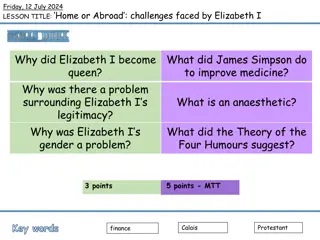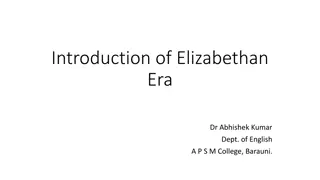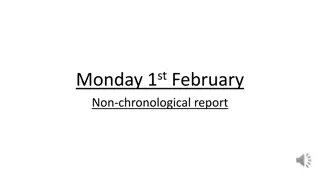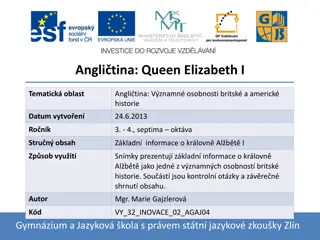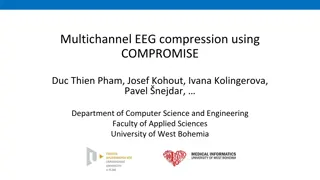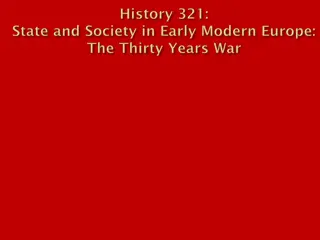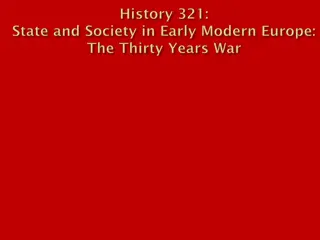Elizabeth of Bohemia (1618-80)
debates on the interaction of soul and body, Descartes' view on spiritual substance, Elizabeth of Bohemia's inquiries, and Arnauld's objections to Meditations. Delve into the concept of God as a quasi-efficient cause and the circular reasoning in the guarantee of clear ideas.
Download Presentation

Please find below an Image/Link to download the presentation.
The content on the website is provided AS IS for your information and personal use only. It may not be sold, licensed, or shared on other websites without obtaining consent from the author.If you encounter any issues during the download, it is possible that the publisher has removed the file from their server.
You are allowed to download the files provided on this website for personal or commercial use, subject to the condition that they are used lawfully. All files are the property of their respective owners.
The content on the website is provided AS IS for your information and personal use only. It may not be sold, licensed, or shared on other websites without obtaining consent from the author.
E N D
Presentation Transcript
Elizabeth of Bohemia (1618-80) Elizabeth (6 May 1643): if soul and body are distinct substances, how they can affect one another? Descartes: (1) we know spiritual substance (soul) by intellect as the activity of thinking; (2) we know body as the ideal object of pure extension, figure, and movement (i.e. as object of intellect and imagination); and (3) we know of the mind body union only by sense. Elizabeth confuses what we sense (3) with what we know (2). So just as we know that gravity moves bodies (but not as another body), we know the soul moves human body.
Elizabeth and Descartes Elizabeth: but how can an immaterial object move a material object (i.e. the problem of interaction)? Descartes: soul is no object but principle of motion Elizabeth (6 May 1643): how is the substance of the soul separate from its activity (thought)? Descartes: soul is defined by its activity (thought); body by its (ideal) extension/shape/movement; and the soul body union by their powers to affect one another in sensations and passions. But the soul is not a thing like the body; it is the substance by which the body is identified in terms of qualities such as heaviness or movement.
Elizabeth and Descartes Elizabeth (10 June 1643): how can the soul be governed by the body? Descartes: we can conceive of the soul as activity only by the understanding; we can conceive of the body as an idealized or imagined object of the understanding; and we can conceive of the soul body union materially most clearly by the senses. Elizabeth (1 July 1643): I still don t see how appealing to the understanding or the imagination helps explain how the soul moves the body.
Obj. IV, Antoine Arnauld (1612-1694) Arnauld: God is not a positive efficient cause, for he does not exist prior to himself. He is derived from himself only negatively he is posited , but not in the sense of being derived from something else (59). Descartes: God is not an efficient cause of himself, nor does he need one (60). He is a formal or a quasi-efficient cause (62) that needs no positive (real) cause: his existence is his essence.
Arnauld: Objections IV to the Meditations Arnauld: I know God exists because I have a clear, distinct idea of him; I can trust clear, distinct ideas because God guarantees them (60). (Circular!) Descartes: when we perceive something clearly and distinctly, we do not subsequently judge that it is true: we simply know it (62). Arnauld: For Descartes, we are aware of everything of which we think. But there are many things in my mind of which I (and children) are unaware (60). Descartes: we are always aware of what we think, because our mind is the thinking of that thing (even if we don t remember all those things) (63).
Arnauld, On True and False Ideas (1683) Soul/mind is the thinking. The idea of an object is what the mind perceives in perceiving a thing: it is the objective content of what we are thinking (63). Perception is the activity of the soul in perceiving; idea is the content or object of perception. Ideas do not represent anything distinct from our ideas (63). The idea of an object ( intelligibly conceived ) is not the object conceived or perception (64). Objective existence is the content of an idea, formal existence is the having of that content.





